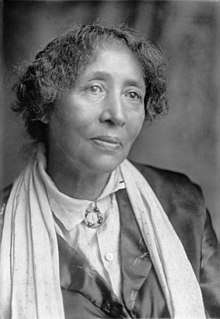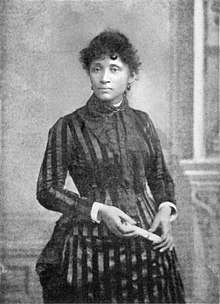
Most anarchists believe the coming change can only come through a revolution, because the possessing class will not allow a peaceful change to take place; still we are willing to work for peace at any price, except at the price of liberty.
Lucy E. Parsons (1853 – 7 March 1942) was a radical American labor organizer, anarchist, and orator. She was born in Texas, likely as a slave, to parents of Native American, Black American and Mexican ancestry. She often went by the name of Lucy Gonzalez.
Quotes

Anarchists know that a long period of education must precede any great fundamental change in society, hence they do not believe in vote begging, nor political campaigns, but rather in the development of self-thinking individuals.
- Let every dirty, lousy tramp arm himself with a revolver or a knife, and lay in wait on the steps of the palaces of the rich and stab or shoot the owners as they come out. Let us kill them without mercy, and let it be a war of extermination.
- Statement appearing in the Chicago Tribune in 1885, as quoted in "What’s Missing From Black History Month" by Jon Hochshartner in The Red Phoenix (10 February 2012)
- Never since the days of the Spartan Helots has history recorded such brutality as has been ever since the war and as is now being perpetrated upon the Negro in the South. How easy for us to go to Russia and drop a tear of sympathy over the persecuted Jew. But a step across Mason’s and Dixon’s line will bring us upon a scene of horrors before which those of Russia, bad as they are, pale into insignificance! No irresponsible, blood-thirsty mobs prowl over Russian territory, lashing and lynching its citizens.
- "Southern Lynching" (April 1892)
- Women are stripped to the skin in the presence of leering, white-skinned, black-hearted brutes and lashed into insensibility and strangled to death from the limbs of trees. A girl child of fifteen years was lynched recently by these brutal bullies. Where has justice fled? The eloquence of Wendell Phillips is silent now. John Brown’s body lies moldering in the grave. But will his spirit lie there moldering, too? Brutes, inhuman monsters—you heartless brutes—you whom nature forms by molding you in it, deceive not yourselves by thinking that another John Brown will not arise.
- "Southern Lynching" (April 1892)
- What has ever been granted to the countless millions of workers of Earth without a fight? Czar Nicholas has discovered that he is not all Russia. Will he "let the voice of the people be heard"? Was it argument or force that changed Czar Nicholas's mind? Well, the Russia people have gotten thin edge of the wedge in; let them keep striking hard, they will split the throne after a while.
- "On Revolution in Russia and Chinese Use of the Boycott", (1905)
- The trusts will not allow you to vote them out of power because they are the power, as is shown by the interview given above.
- "Wage Slaves vs Corporations" (1905)
- Remind them that the sword still hangs upon the wall and the heart still beats within the man, and that that sword will be unsheathed again, if necessary, in defense of your rights. Given them to understand that you will not stand patiently by and see your hard earnings squandered by a luxuriating class of idlers. If the American manhood will arouse itself and speak to those fellows in plain language, not to be misunderstood, they can save themselves, their country and their children, from the fate of poverty which awaits them. Will you do it?
- "Wage Slaves vs Corporations" (1905)
- Never be deceived that the rich will allow you to vote away their wealth.
- Lucy Parsons: Freedom, Equality & Solidarity - Writings & Speeches, 1878-1937
- Oh, working man! Oh, starved, outraged, and robbed laborer, how long will you lend attentive ear to the authors of your misery? When will you become tired of your slavery and show the same by stepping boldly into the arena with those who declare that "Not to be a slave is to dare and DO?" When will you tire of such a civilization and declare in words, the bitterness of which shall not be mistaken, "Away with a civilization that thus degrades me; it is not worth the saving?"
- "Our Civilization: Is It Worth Saving?" (1885)
- Who, pray, are benefiting by all this waste and confusion? The dew, a mere small percentage of the population of the world. All the remainder submit, because they think "it always has been so and it must always be so." The work of those who have a conception of a true society of the future, must devote all their efforts towards disabusing the people's minds of the ancient false hoods. It can be done. Many other hoary lies have passed away, so will this one, too.
- "Property Rights vs. Human Rights" (Nov. 1905)
- They call us Reds. I don't know that that is very bad. I do not believe that is a very bad name. We are pretty red. I tell you I am a real Red.
- "May Day Speech" (1930)
The Principles of Anarchism
- Governments never lead; they follow progress. When the prison, stake or scaffold can no longer silence the voice of the protesting minority, progress moves on a step, but not until then.
- My mind is appalled at the thought of a political party having control of all the details that go to make up the sum total of our lives. Think of it for an instant, that the party in power shall have all authority to dictate the kind of books that shall be used in our schools and universities, government officials editing, printing, and circulating our literature, histories, magazines and press, to say nothing of the thousand and one activities of life that a people engage in, in a civilized society.
- The philosophy of anarchism is included in the word "Liberty"; yet it is comprehensive enough to include all things else that are conducive to progress. No barriers whatever to human progression, to thought, or investigation are placed by anarchism; nothing is considered so true or so certain, that future discoveries may not prove it false; therefore, it has but one infallible, unchangeable motto, "Freedom." Freedom to discover any truth, freedom to develop, to live naturally and fully. Other schools of thought are composed of crystallized ideas — principles that are caught and impaled between the planks of long platforms, and considered too sacred to be disturbed by a close investigation. In all other "issues" there is always a limit; some imaginary boundary line beyond which the searching mind dare not penetrate, lest some pet idea melt into a myth. But anarchism is the usher of science — the master of ceremonies to all forms of truth. It would remove all barriers between the human being and natural development.
- Anarchists know that a long period of education must precede any great fundamental change in society, hence they do not believe in vote begging, nor political campaigns, but rather in the development of self-thinking individuals.
We look away from government for relief, because we know that force (legalized) invades the personal liberty of man, seizes upon the natural elements and intervenes between man and natural laws; from this exercise of force through governments flows nearly all the misery, poverty, crime and confusion existing in society.
- Most anarchists believe the coming change can only come through a revolution, because the possessing class will not allow a peaceful change to take place; still we are willing to work for peace at any price, except at the price of liberty.
- So many able writers have shown that the unjust institutions which work so much misery and suffering to the masses have their root in governments, and owe their whole existence to the power derived from government. We cannot help but believe that were every law, every title deed, every court, and every police officer or soldier abolished tomorrow with one sweep, we would be better off than now.
- Who can measure the worth of a Shakespeare, a Michelangelo or Beethoven in dollars and cents?
External links
This article is issued from
Wikiquote.
The text is licensed under Creative
Commons - Attribution - Sharealike.
Additional terms may apply for the media files.